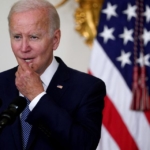
Skeptics of the Student-Loan Forgiveness Plan
By John L. Dorman and Ayelet Sheffey
Treasury Secretary Janet Yellen was skeptical of a large-scale student-loan forgiveness plan as President Joe Biden was mulling over the specifics to address student debt, with first lady Jill Biden also expressing reservations of such a plan, while Vice President Kamala Harris was one of the administration’s staunchest backers of debt cancellation, according to The New York Times.
While Yellen — a longtime economist who served as the chair of the Federal Reserve Board from 2014 to 2018 — told lawmakers in May that broad student-loan relief “could be good for the economy,” she clearly had her reservations. She felt that a large cancellation of debt could have an enormous impact on the economy during a time when inflation in recent months has hit highs not seen since the early 1980s, per the report.
Shortly after taking office last year, Biden began to hear from economists who had concerns about a large-scale forgiveness program, per the report. For more than a year, the president said his administration was studying the issue, and in one of his first actions in office, he extended the student loan payment pause for most federal student loan borrowers that started under the Trump administration during the coronavirus pandemic.
Meanwhile, Biden remained unsure of what decision to make, as he sought to digest insight from individuals who had expressed hesitation about a student-loan forgiveness plan, per the report. In a February town hall last year, for example, he was skeptical of his authority to cancel as much as $50,000 in student debt — an amount many Democratic lawmakers were pushing for.
First lady Jill Biden also had reservations about such a plan, according to individuals close to the longtime educator who spoke with The Times.
Jill Biden — a community college professor who has continued to teach while living at the White House — had for years lobbied for tuition-free community college, which was poised to be included in the bill formerly known as the Build Back Better Act. (The tuition plan was axed as a way to shrink the cost of the bill, but it still fell apart after intraparty infighting.)
As many top Democrats sought to push Biden on the issue, several House Democrats sought to convince Jill Biden that a student-loan cancellation plan being enacted wouldn’t dampen the president’s support of tuition-free community college, according to The Washington Post.
And Vice President Kamala Harris — whom Biden pledged would be a full governing partner during the 2020 presidential campaign — was at the forefront of the Democratic push to cancel student loan debt. In February, Harris instructed her staff to write up a memorandum detailing Biden’s concerns about loan cancellation, with added notes to address the president’s points, per an administration official who spoke with The Times.
Biden had some reservations about the plan being seen as one benefiting “private elite schools,” and Harris’ team sought to counter the hesitancy by noting that “only 0.3 percent of federal loan borrowers attended Ivy League schools,” per the report.
To rebut criticism that student loan debt should be addressed by Congress — a point that other Democratic lawmakers have raised — the Harris memo stated that an executive order was already being employed that paused most federal student loan payments.
Biden on Wednesday announced that he would forgive $10,000 in federal student-loan debt for borrowers earning under $125,000 per year, with up to $20,000 in relief for those who received Pell grants and fall under the same income threshold. Also critical in the plan is Biden capping monthly repayment of federal student loans at 5% of an individual’s income through a new income-driven repayment plan, along with his fifth, and final, extension of the student-loan payment pause through December 31.







